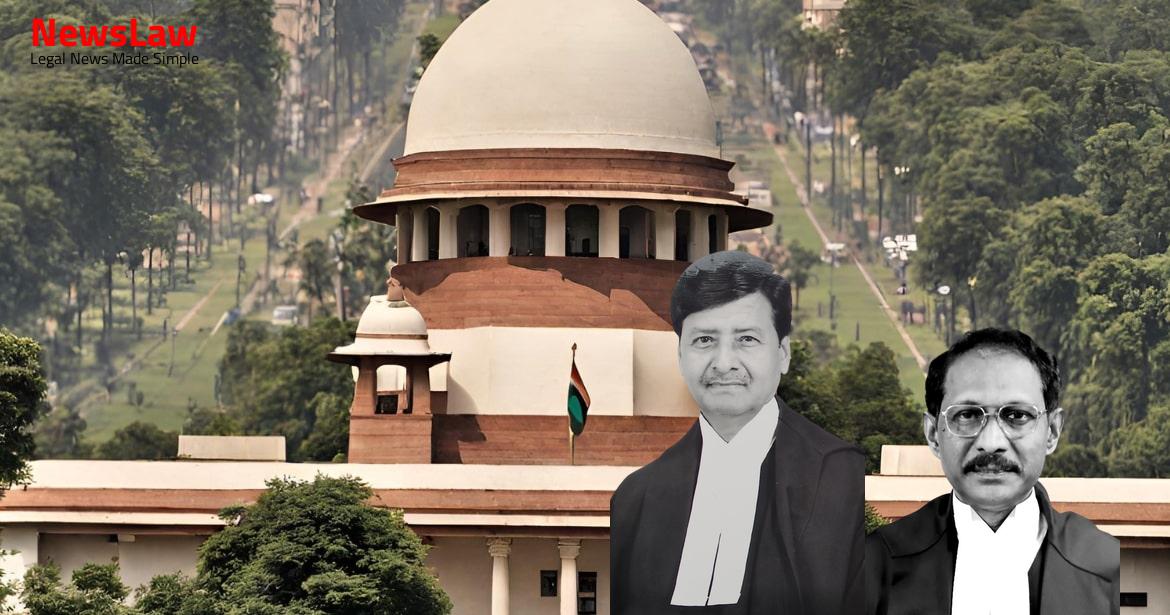Explore a recent legal case that delves into the complex world of policy circulars and the principle of res judicata. The court’s analysis sheds light on the importance of finality in litigation and how previous decisions can impact current legal proceedings. Stay tuned to unravel the intricate legal framework surrounding policy decisions and the principle of res judicata.
Facts
- The application for reduction in contract demand by respondent no.3 was not granted due to existing policy of MSEDCL.
- Circular dated 2.9.1999 partially modified the policy regarding reduction in contract demand for CPP holders.
- Reduction in contract demand was permitted for CPP holders up to 2.5 MVA or 50% of contract demand of 5 MVA and above.
- CPP holders with contract demand less than 5 MVA were not allowed reduction in contract demand.
- Respondent no.3 had two independent connections with contract demand less than 5 MVA, thus not entitled to reduction in contract demand.
- MSEDCL submitted a proposal for tariff revision in 1999 to the Government of Maharashtra as per Section 59 of the Act of 1948.
- Circulars in 1999 and 2000 imposed penalties for over-drawal of power on CPP holders.
- Respondent no.3 sought reduction in contract demand for its units in 1998 and 1999.
- MERC passed orders directing compliance with Act of 1948 for clearance of pending applications.
- MERC quashed certain circulars related to CPP policy and directed refund by MSEDCL to respondent no.3.
- Various circulars were submitted by MSEDCL to MERC for approval.
- MERC was constituted on 5.8.1999 and its approval was deemed necessary by APTEL for certain circulars.
- The financial liability for refunds imposed on MSEDCL was considered burdensome due to additional generation costs.
- APTEL failed to consider unauthorized connections by respondent no.3 and retrospective quashing of circulars by MERC.
- Policy decisions and circulars were aligned with State Government directives and regulations.
- Stand-by power requests were made by respondent no.3 to MSEDCL.
- The clubbing of units for increased contract demand was opposed by MSEDCL due to infrastructure costs.
- Circulars regarding CPP policy were deemed valid as per State Government regulations.
- MERC order dated 10.1.2002 stated that CPP is under the jurisdiction of the Government of Maharashtra and Commission has power to aid in policy formulation.
- Appellant-MSEDCL issued circulars related to CPP and had the power to alter tariffs.
- High Court directed the case to MERC, which ultimately set aside the circulars issued by appellant-MSEDCL regarding CPP.
- MERC’s order in Case No.55 of 2003 stated that no additional financial burden was imposed on CPP holders.
Also Read: Preservation of Fundamental Rights in Education
Analysis
- The levy of tariff for minimum consumption at 25% of the energy consumed in the preceding 12 months before the commissioning of the CPP at the rate of 110% of the tariff is considered unreasonable.
- The Commission did not decide on the merits of the CPP as it was considered a policy matter.
- The Government directed MSEB to cancel its circular as it was not in line with the State’s policy.
- A notification cannot be inconsistent with the terms of the agreement.
- If a subsequent notification is quashed, it will not revive the earlier notification.
- The dispute pertains to the period from 2.9.1999 to 28.4.2000, and it is confirmed that the respondents used electricity to manufacture their products.
- The Commission and APTEL decisions regarding the quashing of circulars are set aside.
- The Commission’s sole and exclusive power to frame the tariff was emphasized.
- The cost incurred on production was passed on to buyers/consumers, so ordering a refund would lead to unjust enrichment.
- The Commission should have considered the effect of its orders and the merits of various circulars while fixing the tariff.
- The principle of res judicata as enunciated in Section 11 of the Code of Civil Procedure, 1908, was discussed.
- Decision in BSES Ltd. v. Tata Power Co. Ltd., (2004) 1 SCC 195, highlighted the importance of the principle of res judicata.
- The decision reiterated that the principle of res judicata is a rule of public policy and is based on the need of finality in litigation.
- Res judicata prevents the re-agitation of a matter that has already been adjudicated upon by a competent court.
- The principle of res judicata applies to civil suits, appeals, revisions, writ petitions, etc.
- The matter of dispute dating back to 2.9.1999 to 28.4.2000 is deemed inappropriate to be remitted for a decision on merits after two decades.
- The circular dated 2.9.1999’s influence during the mentioned period is a key factor in this decision.
- Orders by the Commission and APTEL are set aside, deeming them illegal, as were the circulars and policy decisions pre-Commission establishment.
- In conclusion, the order regarding the refund of the amount recovered by MSEB is set aside in light of the circumstances.
Also Read: Legal Analysis on Shareholding and Nomination Rights
Decision
- The parties are directed to bear their own cost incurred.
- The appeal is allowed to the aforesaid extent.
Also Read: Legal Analysis of Change in Law Compensation in Power Purchase Agreements
Case Title: MAHARASHTRA STATE ELECTRICITY DISTRIBUTION CO. LTD. Vs. UNION OF INDIA (2020 INSC 230)
Case Number: C.A. No.-004304-004304 / 2007



